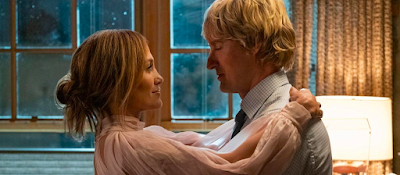I don’t think Marry Me will single-handedly revive the romantic comedy as a going concern, but it sure is a nice reminder why we miss them. It certainly helps that it stars two hugely likable performers whose careers might’ve been filled with more of these if the bottom hadn’t fallen out of the genre’s theatrical prospects. Jennifer Lopez plays a Jennifer Lopez type: a global pop star whose every move is hounded by gossip and paparazzi. (The one difference is age; it’s fun to hear the 52-year-old’s character described as “north of 35.”) Owen Wilson plays an Owen Wilson type, if he was a divorced middle-aged middle school math teacher. His friend (Sarah Silverman) invites him to bring his daughter (Chloe Coleman) to the pop star’s concert. The singer plans to marry her pop star boyfriend (played by actual pop star Maluma) at this sold-out show. But just before taking the stage for their vows, Page Six reports on his infidelity. Dazed and heartbroken, she points out at the crowd where Wilson happens to be holding his friend’s “Marry Me” sign. “Sure,” the singer says. “Why not?” Thus begins a whirlwind romance that starts as a stunt, stays surface weird for a tentative spell, and then slowly but surely becomes the real thing. You know the drill.
Lopez and Wilson make for a good pairing, believable both in the from-separate-worlds unlikely pairing and in the sweet, surprisingly simpatico, flirtatious first blushes of affection. Lopez has the hard outer shell of glamor and style, with the soft underbelly of an underdog. Wilson has a slightly spaced affect, warm earnestness, and shaggy melancholy. It’s fun to see these line deliveries and personalities mingle on screen, even as the picture around them sometimes strains for even a baseline believability. To say the things these characters take in stride, or shrug off, stretch credulity is an understatement. There’s not a single moment where the world they inhabit feels real—it’s all fizzy and fuzzy fantasy visions of both their professions. And the screenplay is loaded up with assistants and gay best friends and cute kids, each doing their turn in the margins to prop up the agreeable, sometimes charming, but never quite as funny as it could be scenes. But because the leads are so winning, and the movie stays so brightly keyed into their charms as performers, it stays just barely aloft as the cliches pile up.
It leaves no opportunity for a romantic gesture untaken—a school dance, a concert, a mathlete competition. You better believe there are songs sung, dances taught, signs held up, arrivals made last-minute, and announcements given dramatically in front of audiences. Some of these happen two or three times, even. It feels like watching Hollywood start up a long-dormant trope machine as the movie creaks and groans as it tries to find its way back to what used to be effortless. Director Kat Coiro and screenwriters John Rogers, Tami Sagher, and Harper Dill come from the world of sitcoms, and though the movie’s anamorphic style is suitably big-screen, the movie is often at its best in smaller, snappier, sweeter character moments than when it tries to explain its conceit’s ramifications in any concrete detail. And yet, the bigger cheery artifice of it all still manages to prove that rom-com tropes still work if done with even a minimal commitment. Even one just north of the Hallmark Channel movies’ quality can pluck the heart strings when the actors’ eyes twinkle with love as their faces draw near, the lighting gets soft, the music swells, and for a brief moment we might really believe a pop star and a middle school teacher can build a life together. (Speaking of: if any pop stars are reading this, my DMs are open.) This is the kind of harmless fantasy I wish we could add back into our regular multiplex diets.


No comments:
Post a Comment